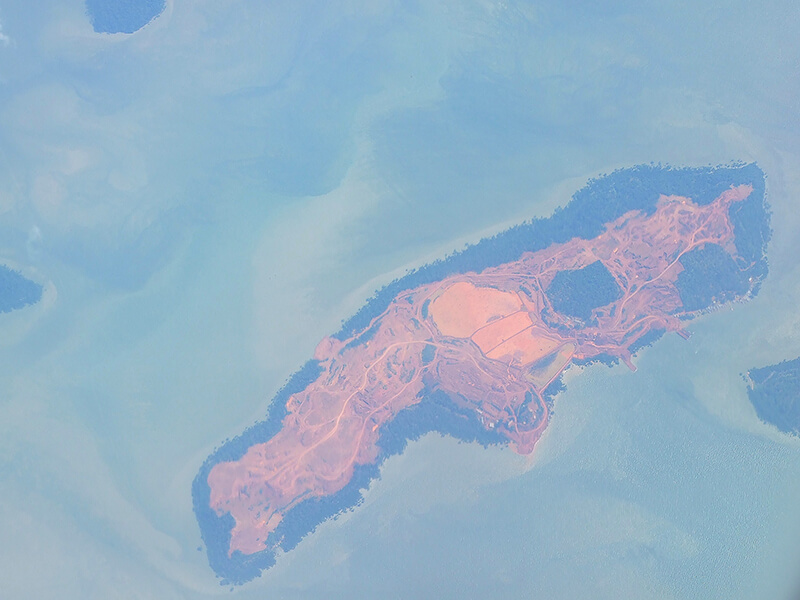December 3, 2018
Purdue study: Sustainable palm oil doesn't make the grade
 An Indonesian island shows signs of significant deforestation. Purdue’s Roberto Cazzolla Gatti has shown that measures taken to make palm oil production sustainable have not stopped deforestation in Southeast Asia. (Photo credit; Roberto Cazzolla Gatti)
Download image
An Indonesian island shows signs of significant deforestation. Purdue’s Roberto Cazzolla Gatti has shown that measures taken to make palm oil production sustainable have not stopped deforestation in Southeast Asia. (Photo credit; Roberto Cazzolla Gatti)
Download image
WEST LAFAYETTE, Ind. – From food and biofuels to cosmetics and detergents, palm oil is found in countless products these days. Demand for the oil has surged in the last decade - global usage went from 37 million metric tons in 2006 to 64.2 million in 2016 - in part because it is cheap and, for a time, enjoyed a good-for-you reputation.
But what sounds good for us isn’t good for the forests where oil palms (Elaeis guineensis) are harvested. According to a Purdue University study, deforestation is rising in major oil palm-producing countries. And it’s happening even faster in areas certified as “sustainable.”
“Oil palms are grown in some of the most sensitive and ecologically important forests in the world. Protecting them is important,” said Roberto Cazzolla Gatti, research associate at the Forest Advanced Computing and Artificial Intelligence Lab of the Department of Forestry and Natural Resources at Purdue University. “But we’ve seen that even when operations are certified as sustainable, there is still significant forest loss. It seems that there is no way to sustainably produce palm oil to meet today’s global demand.”
Gatti and colleagues from Purdue and Russia’s Tomsk State University published their findings in the journal Science of the Total Environment.
The Roundtable on Sustainable Palm Oil (RSPO), formed by retailers, banks, investors and environmental advocates in 2004, and the Palm Oil Innovation Group, a similar organization founded in 2013, developed guidelines that allow for sale of palm oil as sustainable. That label means ensuring that forest conservation value is assessed and steering clear of high-carbon stock areas.
Those efforts, according to Gatti’s research, are not effective. In areas where certified sustainable palm oil is being harvested, deforestation is rapidly increasing.
Based on records from governmental departments and non-governmental organizations, as well as satellite data from 2001-2016, Indonesia, Malaysia and Papua New Guinea have lost about 31 million hectares of forest cover. That’s about 11 percent of their total land cover.
Since 2007, the forest loss has been about 41,000 hectares per year. In areas where sustainable practices are required, more than 38 percent of the land has been deforested. That compares with 34 percent where there is no sustainability requirement.
“If you need to produce palm oil, you need to remove forest,” Gatti said. “That’s what we’re seeing.”
That removal often consists of slashing and burning, which pollutes the environment and can negatively affect human health. It also emits greenhouse gases.
Deforestation also threatens habitats for many plants and animals, in particular, for the three remaining species of orangutan on the planet.
Gatti said that while palm oil is cheap and requires less land to produce than many alternatives, the negatives are impossible to ignore.
“We should be conscious of our use of products with palm oil and consider alternatives such as rapeseed, canola, flaxseed and sunflower,” Gatti said. “We lived for many centuries without palm oil. We can certainly do it again.”
Writer: Brian Wallheimer, 765-532-0233, bwallhei@purdue.edu
Source: Roberto Cazzolla Gatti, 765-775-9027, rgatti@purdue.edu
ABSTRACT
Sustainable palm oil may not be so sustainable
Roberto Cazzolla Gattia,b, Jingjing Lianga, Alena Velichevskayab, Mo Zhoua
- a. Department of Forestry and Natural Resources, Purdue University, West Lafayette, IN, USA
- b. Biological Institute, Tomsk State University, Russian Federation
The globalization of the palm oil trade poses a menace to the ecosystem integrity of Southeast Asia. In this short communication, we briefly discuss why palm oil certifications may have failed as an effective means to halt forest degradation and biodiversity loss. From a comparison of multiple new datasets, we analysed recent tree loss in Indonesia, Malaysia, and Papua New Guinea, and discovered that, from 2001 to 2016, about 40% of the area located in certified concessions suffered from habitat degradation, deforestation, fires, or other tree damages. Certified concessions have been subject to more tree removals than non-certified ones. We also detect significant tree loss before and after the start of certification schemes. Beyond non-governmental organisations' concern that Roundtable on Sustainable Palm Oil (RSPO) and Palm Oil Innovation Group (POIG) certifications allow ongoing clearance of any forest not identified as of high conservation values (HCV) or high carbon stock (HCS), we suggest an alarming and previously overlooked situation, such as that current “sustainable palm oil” is often associated with recent habitat degradation and forest loss. In other words, certified palm oil production may not be so sustainable.
Agricultural Communications: (765) 494-8415;
Maureen Manier, Department Head, mmanier@purdue.edu

